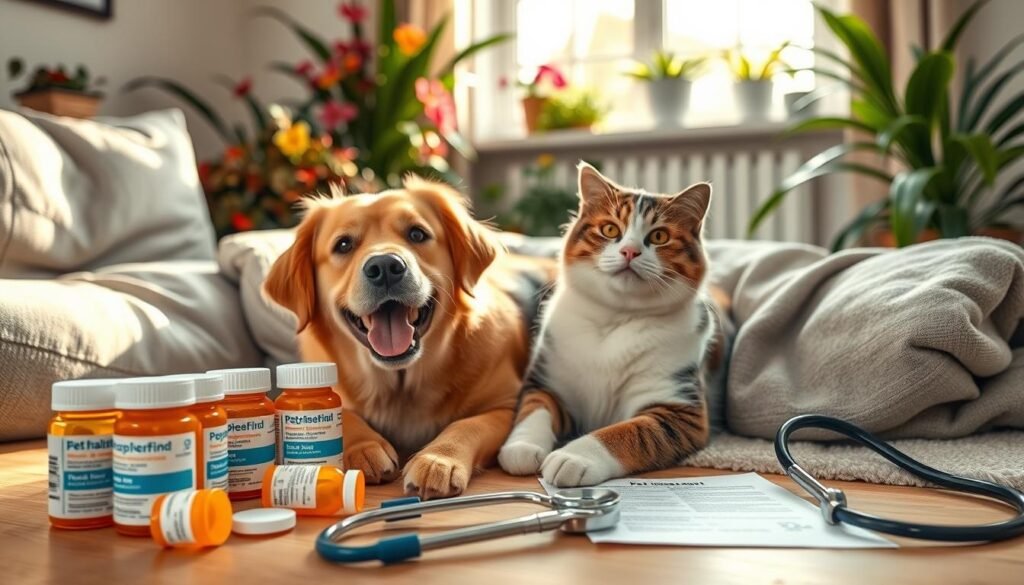Did you know a single dose of canine insulin can cost up to $50 without insurance1? Veterinary care costs are rising, making pet insurance essential. But does it cover prescription meds? Understanding pet insurance and medication coverage is key to keeping your pet healthy without financial strain.
In this guide, we’ll dive into pet insurance and prescription coverage. We’ll look at how medication coverage works, the types of meds covered, and the cost savings. Whether you’re new to pet ownership or want to protect your pet, this article will help you make smart healthcare choices.
Key Takeaways
- Pet insurance policies vary in the percentage of medication costs they reimburse, with some covering up to 90% of the cost2.
- Most pet insurance policies cover prescription medications for common conditions in dogs and cats, but may exclude coverage for preexisting conditions13.
- Anxiety, allergy, and heartworm medications are typically covered by pet insurance policies, but the percentage of coverage can vary1.
- Prescription pet foods may be covered by some pet insurance plans, but the coverage varies among providers2.
- Evaluating possible savings by comparing pet insurance costs and coverage options is key to finding the right plan for your pet’s needs3.
Understanding Pet Insurance and Prescription Coverage
When your cat or dog needs a prescription from the vet, you’ll pay first and then claim it back from your insurance4. The coverage for prescription drugs varies a lot between insurance plans. It’s key to know how it works before picking a policy.
How Medication Coverage Works in Pet Insurance
Most pet insurance plans cover prescription meds for injuries, illnesses, and chronic conditions4. This includes pain meds, anti-inflammatory drugs, antibiotics, and meds for long-term issues like diabetes or arthritis4. The amount you get back and any deductibles or copays depend on your policy.
Differences Between Prescription and Chronic Medications
Prescription meds are for short-term use to treat specific problems5. Most pet insurance plans cover these well5. Chronic meds, for ongoing conditions like allergies or thyroid issues, have varied coverage5. Some plans cover them fully, while others have limits or exclusions5.
| Prescription Medications | Chronic Medications |
|---|---|
| Short-term use to treat specific conditions | Long-term management of ongoing issues |
| Generally well-covered by pet insurance | Coverage can vary, with some plans limiting or excluding it |
“Understanding the differences between prescription and chronic medication coverage is key when choosing a pet insurance plan that fits your pet’s health needs.”
Types of Medications Covered by Pet Insurance
Understanding what pet insurance covers is key. Most plans pay for prescription meds for covered conditions6. But, preventive meds like flea treatments and vaccines are often not included6. Some plans offer add-ons for these costs6.
Common Conditions Requiring Prescribed Medications
Pets need meds for many health issues, like infections and chronic diseases6. But, insurance usually doesn’t cover pre-existing conditions or their meds6. Over-the-counter meds are also not covered because they’re not vet-prescribed6.
Anxiety, Allergy, and Heartworm Medications
Spot pet insurance covers vet-prescribed foods, meds, and supplements for covered conditions6. It also covers treatments for pre-existing conditions that have been untreated for 180 days6. Knee injuries are an exception, covered by Spot6.
Medications for anxiety, allergies, and heartworms are usually covered6. The cost can be $15-$300 monthly, depending on the pet’s needs7.

“Prescription medications for pets can add up quickly depending on the type of medication needed, the dosage, and the specific vet and location. For example, a Siberian husky named Kailee required insulin for diabetes, costing $680, with MetLife Pet Insurance covering nearly $550 of the bill.”8
Pet insurance can help with the cost of these essential meds678.
Does Pet Insurance Cover Prescriptions?
Yes, pet insurance usually covers medication if it’s FDA-approved and prescribed by a vet. This is for health conditions covered by your policy9. But, it doesn’t cover medication for pre-existing conditions9. It’s important to check your policy details to know what’s covered9.
Most plans, like Pets Best’s BestBenefit, cover many prescription medications9. You can also get some coverage for heartworm tests and prevention with add-on plans9.
- The Accident Only plan covers surgeries for accidents, while BestBenefit covers surgeries for illnesses like cataracts and hip dysplasia9.
- Pet insurance covers euthanasia for humane reasons but not cremation costs9.
- Pets Best offers insurance for cats and dogs, with discounts for multiple pets9.
With vet costs rising by up to 11.4% in 2023, pet insurance is very helpful10. It can cover medication and treatments for unexpected illnesses or injuries10.
| Key Insights | Data |
|---|---|
| Growth in insured pets | Insured pets in the U.S. have grown by 22.5% each year on average from 201810. |
| Increase in pet care costs | Pet care costs rose by 10% from 2022 to 2023, according to the U.S. Bureau of Labor Statistics10. |
| Reimbursement timeline | On average, pet insurance policyholders get reimbursed in 5 to 9 days after submitting a claim10. |
| Plan types | About 98% of pet insurance plans are accident-illness plans, covering accidents and illnesses. Accident-only plans only cover emergency care for accidents10. |

When picking a pet insurance plan, think about the coverage for prescription meds. Also, look at the plan’s overall scope. This ensures your pet gets the care they need without breaking the bank910.
Coverage for Prescription Pet Foods
Pet insurance often covers medication costs. But, some plans also cover prescription pet foods. These foods are for pets with conditions like kidney disease or food allergies. They are important for pets with long-term health needs11.
But, not all pet insurance covers prescription foods. The coverage varies by provider. Some, like ASPCA Pet Insurance, Pumpkin, and Spot, include it in their plans. Others, like Embrace, might offer it as an add-on12.
Reimbursement rates also differ. Trupanion covers 50% of the first two months of a prescribed diet. Figo offers up to $250 for food as the main treatment for an illness with its “Powerups” add-on12.
If your pet needs special food, check your insurance policy. Special diets can be expensive, but insurance can help. This ensures your pet gets the right food11.
Even without insurance, you can save on special diets. Buy in bulk, use loyalty programs, or try homemade diets with vet advice12.
In summary, while not all pet insurance covers special foods, it’s valuable for pets with chronic conditions. Knowing your policy and finding ways to save can help. This way, your pet gets the right food without costing too much1112.
The Costs of Pet Medications with Insurance
Caring for your pets can get expensive, fast. This is true for prescription and chronic medications, which can cost a lot13. Pet insurance can help, but you need to weigh the savings against the cost of premiums, deductibles, and co-payments14.
Before choosing a pet insurance plan, think about your pet’s needs. If your pet needs daily medication for a long-term condition, the cost can add up13. A good plan can save you money in the long run.
Evaluating the Savings with Pet Insurance
When picking a pet insurance plan, look at the details. This includes annual coverage limits, deductibles, waiting periods, and reimbursement percentages14. These details can affect how much you’ll save on your pet’s meds.
Some insurance plans cover specific medications, like herbal treatments and insulin13. Comparing these plans can help you find the best one for your pet and your wallet.

Keep in mind, most pet insurance plans require you to pay deductibles and co-payments first13. Knowing this can help you budget for these costs.
“Choosing the right pet insurance plan can make a significant difference in the overall cost of your pet’s medications, potentially leading to substantial savings in the long run.”
Top Pet Insurance Providers and Their Medication Coverage
Several leading providers offer the best pet insurance for prescription coverage15. ASPCA Pet Health Insurance has reimbursement rates of 70%, 80%, and 90% after deductibles of $100, $250, or $50015. For dogs, monthly rates start at $31 at age 2 and go up to $73 at age 8. Cats start at $17 at age 2 and reach $31 at age 815.
Embrace is another top choice, with coverage rates of 70%, 80%, and 90% after deductibles from $100 to $1,00015. Dogs start at $44 at age 2 and reach $80 at age 8. Cats start at $24 at age 2 and reach $42 at age 815.
Hartville offers coverage with rates of 70%, 80%, and 90% after deductibles of $100, $250, or $50015. Dogs start at $32 at age 2 and go up to $77 at age 8. Cats start at $18 at age 2 and reach $33 at age 815.
MetLife provides coverage with rates from 50% to 90% after deductibles from $0 to $2,50015. Dogs start at $42 at age 2 and reach $78 at age 8. Cats start at $23 at age 2 and reach $37 at age 815.

Providers like Figo, Healthy Paws, Lemonade, ManyPets, Nationwide, Pets Best, and Spot Pet Insurance offer various coverage levels16. Their plans differ in deductibles, waiting periods, and coverage limits16. It’s important to research and compare to find the best fit for your pet16.
“With so many pet insurance providers, it’s key to understand each plan to ensure your pet gets the best care.”
Whether you have a dog or a cat, top pet insurance companies offer valuable protection17. They provide 24/7 veterinary helplines, telehealth services, and fast claims processing17. These providers make managing your pet’s healthcare costs easier than ever17.
Commonly Prescribed Medications for Dogs and Cats
Knowing the most common pet medications helps pet owners understand pet insurance better. PetMD says dogs often get antibiotics, antiparasitics, antifungals, corticosteroids, and pain relievers18. Cats get similar meds, like antibiotics, antiparasitics, flea and tick prevention, corticosteroids, and NSAIDs for pain18.
Antibiotics like metronidazole and doxycycline are common for dogs. Amoxicillin is often used for cats18. Antiparasitics like ivermectin for dogs and praziquantel for cats treat parasites18. Antifungal meds like ketoconazole help with fungal skin issues in dogs18.
Corticosteroids like prednisone manage inflammation and allergies in both dogs and cats18. Pain relievers, including NSAIDs like Rimadyl and opioids like butorphanol, help with discomfort18.
Medications for anxiety, heartworm, and diabetes are also common18. Knowing the costs and coverage for these can help pet owners make better healthcare choices19.
The right meds for dogs and cats depend on their health needs and the vet’s advice18. Being informed about common medications helps pet owners deal with pet insurance. It ensures their pets get the care they need20.
What’s Not Covered by Pet Insurance for Medications?
Preexisting Conditions and Non-Covered Procedures
Pet insurance has its limits when it comes to medication coverage. It usually doesn’t cover preexisting conditions or non-covered procedures like cosmetic treatments or spaying/neutering21. A condition is considered preexisting if your pet showed signs before your policy started, even without treatment21.
Preventative meds like heartworm, flea, and tick treatments are also not standard in most plans. You need an optional routine care add-on for these21.
It’s key to read your pet insurance policy well to know what’s not covered. Pet insurance can help with unexpected illnesses and accidents. But, it’s vital to know what treatments and meds are excluded22.
By knowing these limits, you can better plan your pet’s healthcare and budget22.
The cost and coverage of pet insurance vary a lot. It depends on the provider, your pet’s age, breed, and health21. Always compare plans to find the best one for your pet and your budget.
FAQ
How does medication coverage work in pet insurance?
What’s the difference between prescription and chronic medications?
What types of medications are commonly covered by pet insurance?
Does pet insurance cover prescriptions?
Does pet insurance cover prescription pet foods?
How can pet insurance help with the costs of pet medications?
What are the top pet insurance providers for medication coverage?
What are some of the most commonly prescribed medications for dogs and cats?
What types of medications are not covered by pet insurance?
Source Links
- How Does Pet Medication Coverage Work? – https://www.progressive.com/answers/pet-insurance-medications/
- Does Pet Insurance Cover Your Pet’s Medication And Perscriptions? | Bankrate – https://www.bankrate.com/insurance/pet-insurance/does-pet-insurance-cover-medication/
- Does Pet Insurance Cover Medication? – https://www.marketwatch.com/guides/pet-insurance/does-pet-insurance-cover-medication/
- What Does Pet Insurance Cover? | ASPCA® Pet Health Insurance – https://www.aspcapetinsurance.com/research-and-compare/pet-insurance-basics/whats-covered/
- What Does Pet Insurance Cover? (2024 Guide) – NerdWallet – https://www.nerdwallet.com/article/insurance/pet-insurance-coverage
- Does Pet Insurance Cover the Cost of Medication? | Spot® – https://spotpet.com/blog/why-pet-insurance/does-pet-insurance-cover-the-cost-of-medications
- Does Pet Insurance Cover Medication? • Lemonade – https://www.lemonade.com/pet/explained/pet-insurance-cover-medication/
- Does Pet Insurance Cover Prescriptions? | MetLife Pet Insurance – https://www.metlifepetinsurance.com/blog/pet-insurance/medical-prescriptions/
- Pet Insurance Plans and Coverage Options – https://www.progressive.com/pet-insurance/coverages/
- What Is Pet Insurance, How Does It Work & What Is Covered? A Pet Parent’s Guide – https://www.pawlicy.com/blog/what-is-pet-insurance/
- Pet Insurance That Covers Prescription Food | LendEDU – https://lendedu.com/blog/pet-insurance-covers-prescription-food/
- Does Pet Insurance Cover Prescription Food? – NerdWallet – https://www.nerdwallet.com/article/insurance/does-pet-insurance-cover-prescription-food
- Does Pet Insurance Cover Prescriptions? – https://qz.com/advisor/pet-insurance/does-pet-insurance-cover-prescriptions/
- Pet Insurance Simplified| ASPCA Pet Health Insurance – https://www.aspcapetinsurance.com/resources/pet-insurance-simplified/
- Best Pet Insurance Companies for October 2024 – NerdWallet – https://www.nerdwallet.com/p/best/insurance/pet-insurance-companies
- Best Pet Insurance Companies Of October 2024 – https://www.forbes.com/advisor/pet-insurance/best-pet-insurance/
- The best pet wellness plans for routine care – https://www.cnbc.com/select/best-wellness-pet-insurance/
- Does Pet Insurance Cover Medication? – https://www.insuranceopedia.com/pet-insurance/does-pet-insurance-cover-medication
- Pet Insurance That Covers Medication | LendEDU – https://lendedu.com/blog/pet-insurance-covers-medication/
- Does pet insurance cover medication? – https://www.fetchpet.com/the-dig/does-pet-insurance-cover-medication
- What Does Pet Insurance Cover? – https://www.forbes.com/advisor/pet-insurance/what-does-pet-insurance-cover/
- Pet Insurance Coverage – https://www.healthypawspetinsurance.com/pet-insurance-coverage-and-exclusions
